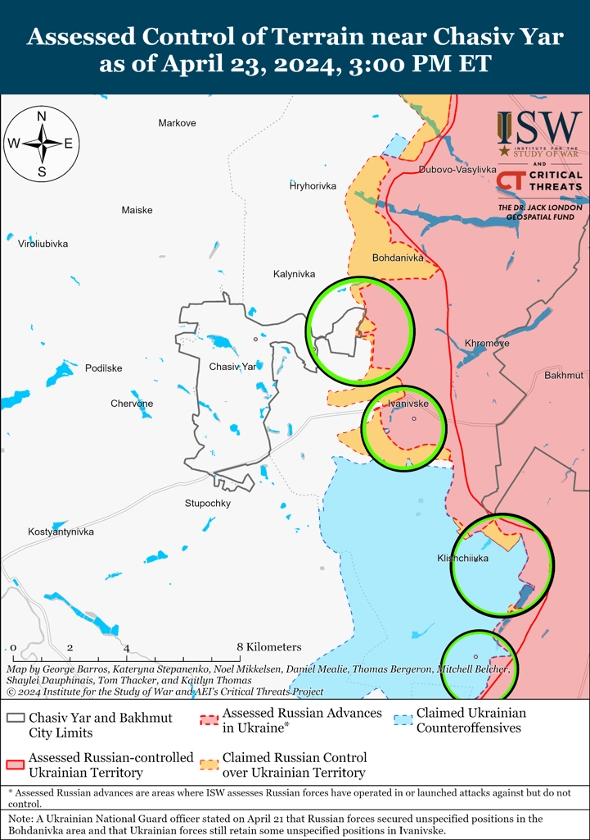Chasiv Yar, a city in the Donetsk region 17 kilometers (11 miles) west of Bakhmut and some 36 kilometers (22 miles) southeast of the Ukrainian stronghold of Kramatorsk is now the most intense hotspot in Russia’s war in Ukraine, following the Kremlin’s capture of Avdiivka in February.
Although taking Avdiivka, which became the graveyard for thousands of Russian troops, was very costly for the Kremlin, the lack of Western supplies to Kyiv has provided Russia with some tactical advantages in its march to capture Chasiv Yar. Despite the odds, Ukrainian troops are defiantly holding the city with the ammo they’ve got.
JOIN US ON TELEGRAM
Follow our coverage of the war on the @Kyivpost_official.
“We see that our courageous soldiers, including the soldiers of the ‘Rubizh’ brigade, are holding back the onslaught of the enemy even in the absence of American aid. And if there is [aid], then, in principle, we can conclude that the enemy will have no chance at all,” Dmytro Kozhubenko, an officer of the Rubizh brigade operating near Chasiv Yar, told Radio Liberty.
But the reality is far from glorious.
Voices from the front
While Ukrainian troops have been able to hold back the Russian offensive, many have talked of dire circumstances on the front.
Kozhubenko told Radio Liberty that while Russia halted its “meat assaults” – a tactic using wave after wave of infantry to storm Ukrainian positions – the pause might just be temporary, and the attacks from the sky never stop.

Russia’s Invasion of Ukraine: 3 Years and Counting
“The enemy never stopped its assaults either in the Chasiv Yar thrust or in any other thrust. It’s just that now they are most likely regrouping, pulling up, perhaps, some of their reserves,” Kozhubenko said.
“There are no longer such strong pressures as there were before. But they do not stop, the enemy continuously destroys our positions with aircraft and artillery.”
A Wall Street Journal (WSJ) report also described Russia’s intensified use of aerial bombs – emboldened by the lack of air defense in Ukraine – which continued to destroy buildings housing Ukrainian troops and volunteers, one by one.
“The walls were shaking so much I thought the building might collapse. We run from one basement to another. That’s how we live,” said Vitaliy Yeremenko, a 59-year-old former construction worker turned humanitarian volunteer.
Glide bombs aside, there are also Russian drones.
“Two months ago, I could just drive into the city, park the car, walk around [...] Now, you have to move fast. There’s a huge threat drones will destroy the vehicle … Sometimes they even attack civilians,” said Mykola Mohylevskiy, a volunteer, evacuating civilians from the front.
According to the WSJ report, the munition shortages have also extended to different aspects of frontline operations, where evacuating the wounded comes without artillery covers and Ukrainian troops have had to make every shot count.
“They can shell a tree line just for fun [...] We can only respond when we’re 100 percent sure of the target,” said a 29-year-old soldier who goes by the call sign Nemo.
Then there’s also the personnel shortage, where a 5-day deployment ended up being 10 to 15 days with soldiers sometimes running out of food, water and medicine.
“Even our commanders are in the positions with us because we’re short of men,” said Kypish, a 38-year-old Ukrainian soldier.
Chasiv Yar and its significance
Chasiv Yar is a small city with a pre-war population of 12,250, but its capture can produce a domino effect that eventually leads to the loss of the Donetsk region.
Roman Svitan, a military expert and reserve colonel in the Armed Forces of Ukraine (AFU), told Novaya Gazeta Europe that Chasiv Yar is a “cornerstone” of Ukrainian defense in the Donetsk region. Its capture could allow Russian troops to shell and move on to Kostyantynivka, Druzhkivka, Kramatorsk, and Slovyansk in the vicinity.
If Russia captures these cities, it would effectively control the entire Donetsk region, once the industrial heartland of Ukraine.
It is also widely believed that Russia aimed to capture Chasiv Yar by May 9, Russia’s Victory Day which commemorates Soviet victory over Nazi Germany, and May 7, Russian President Vladimir Putin’s inauguration.
Current developments (as of April 24)
The Institute for the Study of War (ISW) said Ukraine managed to regain lost positions east of Chasiv Yar, southeast of the town of Ivanivske, in its daily update on April 23.
There are also ongoing engagements east and southeast of the city, according to the ISW.
“Positional engagements continued near Bohdanivka, in the Novyi Microraion, east of Chasiv Yar near Ivanivske, and southeast of Chaisv Yar near Klishchiivka and Andriivka,” reads the ISW daily update.

As of now, Russian troops have not reached the city limits of Chasiv Yar, though Russian milbloggers have claimed that elements of the Russian 98th Airborne (VDV) Division and the “Sarmat” battalion of the Donetsk People's Republic (DNR) “Pyatnashka” international volunteer brigade attacked the eastern outskirts of Chasiv Yar.
You can also highlight the text and press Ctrl + Enter











